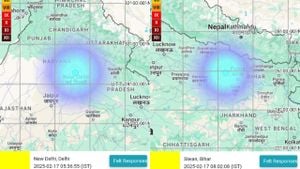Japan is experiencing a notable transition from the harsh winter cold to warmer spring weather, marking the onset of the much-dreaded pollen season. Starting around February 25, temperatures are predicted to increase across the country as a result of changing pressure patterns and the departure of cold air masses.
The Japan Meteorological Agency reports changing conditions, with the warmer days expected to bring highs around 20°C, particularly from the beginning of March, with regions like Kyushu seeing the first peaks of pollen levels early on March 1 and 2. RKB meteorologist Tachitaka Kazumi notes, "The pollen season is finally here, accompanied by higher temperatures. Be prepared!" This is significant news for those afflicted with seasonal allergies, as colder winter weather typically keeps pollen counts low.
This year's pollen season seems to set to begin earlier than usual, exacerbated by specific weather patterns. Meteorologist Kikuchi Mai has mentioned, "We expect temperatures to rise significantly, with highs around 20°C expected next weekend across much of Japan." Such warmth not only signifies spring’s arrival but also presents conditions highly favorable for pollen dispersal, mainly due to the combination of sunny, dry weather and strong winds.
Experts point to three primary conditions under which pollen dispersal significantly spikes: the presence of warm sunny days, dry air coupled with windy conditions, and days following rainfall. With the transitioning weather patterns favoring these conditions, allergy sufferers might find the upcoming weeks particularly challenging. "Weather conditions highly favor pollen dispersal—warm, sunny, and windy days are the worst for allergy sufferers," Kazumi adds.
This shift is corroborated by forecasts anticipating steadily warmer weather, drawing attention to the distinct patterns observed since the cold snap began to lift. Since the effects of climate change have, for years, influenced seasonal weather patterns and the flowering cycles of trees and plants, this spring is particularly noteworthy.
Regions across Japan, including major cities such as Tokyo and Fukuoka, are bracing for increased pollen levels. Reports state the pollen dispersal will begin to escalate shortly after the cold weather lifts, affecting cities from the Kanto region to Kyushu. Pollen counts are expected to peak around Fukuoka, which could experience "very high" levels from the beginning of March.
To mitigate the adverse effects of pollen exposure, healthcare professionals recommend various strategies for those prone to pollen allergies. Using masks and sunglasses when outdoors, staying indoors on high pollen days, and regular washing of clothing can help minimize the impact. Kazumi emphasizes the importance of closely following weather forecasts during this period, cautioning allergy sufferers to monitor pollen levels closely.
Allergic reactions ranging from mild sneezing to severe respiratory distress could become commonplace as spring approaches. Experts urge individuals to prepare proactively to handle the seasonal burdens effectively. This preparation is especially important for those who may have become more sensitized to the pollen due to changing exposure levels over the past year.
The increased occurrences of precipitation and temperature changes also raise concerns about secondary issues, including the potential for flooding and landslides linked to melting snow and heavy rain. Therefore, as Japan warms, residents are advised to remain vigilant not only against pollen but also with respect to environmental hazards exacerbated by the seasonal transitions.
Overall, the warmth is welcomed by many as it signifies the end of winter. Still, as the country stands on the cusp of spring, both the beauty of blooming flowers and the discomfort of allergy season clash, demanding attention. With meteorologists warning of heightened pollen counts and the arrival of springtime warmth, it is clear this season will bring both relief and challenges.
Whether it is enjoying outdoor activities or coping with allergies, the shifting seasons call for thoughtful preparation and awareness. Those affected must recognize the signs of the pollen season and take measures to safeguard their health.



